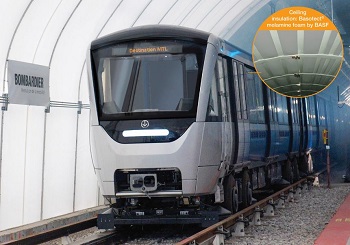BASF announced today that its versatile Basotect® melamine foam is now being used for thermal and acoustic insulation in the ceilings of 468 new metro cars being built by Bombardier for the next generation Montreal subway.
Bombardier chose Basotect based acoustic foam parts provided by Artik/OEM, Inc., a foam converter with locations in Canada as well as the United States servicing Bombardier. With a density of only 9 kg/m³, Basotect helps to reduce the overall weight of the cars and thus contributes to the goals of Bombardier to enhance performance and to increase the energy efficiency of their trains. Using Basotect to replace fiberglass resulted in a 35% weight savings of the roof insulation. In addition, installation of the Basotect parts at the La Pocatière, Quebec facility is much simpler, providing time and cost savings. This is all accomplished without having to sacrifice sound absorption or on fire properties of the insulation.

Its unique properties profile makes Basotect the leading solution for optimum noise management and thermal insulation of subway cars. Due to Basotect’s open-cell, fine foam structure, the sound absorption values in the medium and high frequency ranges are very good. Therefore, passengers of the Montreal subway will experience lower levels of noise within the cars and a more comfortable environment overall.
With a thermal conductivity of less than 0.24 Btu-in/h-ft2-ºF, the foam helps to minimize loss of thermal energy and to keep the inside of the train comfortable. The thermoset melamine resin, which is the base material of Basotect, makes it intrinsically flame-retardant. These fire resistant properties aid in the foam’s ability to meet ASTM E162/E662 and ASTM E1354, which are prerequisites for materials to be approved for use in trains.
The melamine resin foam is easily processed by blade and wire-cutting as well as by sawing and milling – enabling dimensions and contours of customized components to be easily and exactly produced. All parties worked together to create “press in place” Basotect parts for the roof cavity compartments. Jim Graham, Vice President of Business Development at
Artik/OEM, added: “The Basotect parts are supplied to the exact dimensions needed so that Bombardier can pressure fit them into the cavities of the car structure itself, increasing ease of installation and the overall speed of manufacturing.”